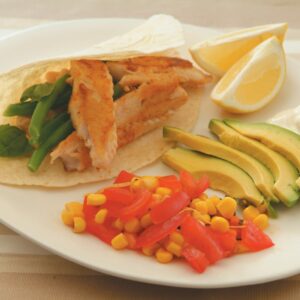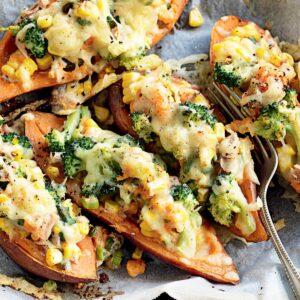
Thinking about trying for a baby? What you both eat will increase your chances, says nutritionist Kate Di Prima.
Let's face facts – no diet can absolutely ensure your success at falling pregnant. But optimising your health and improving your lifestyle can still have a dramatic effect on upping your chances. Consider this Harvard University study: when researchers followed 17,000 women over eight months, they found that those women who adopted just a few positive dietary changes, including reducing certain types of dietary fats, increasing fruit and vegetable intake and decreasing substances such as caffeine and alcohol, improved their chances of pregnancy far beyond those who didn't make any changes. Reason enough to give them a try!
Conception aside, assessing your diet will help you undo any unhealthy eating habits, putting you in better shape for the rest of your life. Why wouldn't you want to give that a go?
Top tips for her
Include B group vitamins
They're all important, although folic acid in particular is crucial, for the healthy formation and closure of the baby's neural tube (between the brain and spinal cord). To help prevent neural tube defects such as spina bifida, it is recommended women take an 800mcg folic acid tablet daily for at least four weeks before conception and for at least 12 weeks into pregnancy. Folate is found in strawberries, spinach, broccoli, oranges, whole grains, legumes and fortified breakfast cereals.
Consume low-GI carbohydrates
These foods are digested slowly, which induces a slow rise in sugar or glucose into the bloodstream. This in turn controls the release of insulin, which may help sex hormones such as oestrogen to regulate ovulation successfully. To get the benefits, swap your white bread and processed breakfast cereal for low-GI options like whole grain bread, crackers and cereals, low-GI fruits (especially those with edible skin), milk, yoghurt and legumes such as chickpeas and lentils.
Aim for a BMI of 20-25
Keeping your weight significantly above or below your healthy weight range is not a good idea: excess weight can affect the hormone signals to your ovaries, potentially causing over-production of male hormones and interrupting the release of eggs. And as women require about 20 per cent of their body weight to be fat in order to menstruate and ovulate normally, being underweight can have serious effects. The good news: just a five per cent loss in body weight can improve fertility.
Choose iron-and calcium-rich proteins
Iron-rich proteins such as meat, chicken, fish, egg and legumes, and calcium-rich proteins such as milk, yoghurt and cheese provide essential pieces to the fertility puzzle. Researchers have found by keeping your weight in the healthy weight range or losing weight using a balanced diet that includes the recommended requirements of both iron and calcium, women have a greater chance of conception.
Reduce trans fats
A Harvard School of Public Health study showed that women who consume higher levels of trans fats in their diet are at a greater risk of infertility. Trans fats may lurk in all sorts of places – vegetable shortening, pastries, ready-made pies, cakes and cake mixes, biscuits, pizza, potato chips, fritters, doughnuts, gravy, sauces and other processed foods. Swap them for foods high in essential fatty acids, such as fish, seafood, eggs, flaxseed oil, canola oil, nuts, seeds and soybeans, and you will be putting yourself in much better stead.
Top tips for him
Balance your diet
A healthy diet is made up of a complex set of interacting nutrients, vitamins and minerals. It is virtually impossible to pinpoint one nutrient that holds the key to male fertility, however studies have shown poor eating habits can lower the quantity and quality of sperm produced.
Combine vitamin C and lycopene
Combining lycopene (a powerful antioxidant found in tomatoes and tomato-based products such as sauces and pastes) and vitamin C (found in fresh fruits, vegetables and salads) may help boost sperm levels in infertile men, prevent sperm defects, and even help with sperm motility (swimming ability).
Reduce alcohol and caffeine
Don't worry – it is safe to have the occasional drink. But studies have shown regular beer, wine or spirit consumption may reduce sperm count and increase abnormal sperm. The effects of caffeine are less clear, but it's suggested you limit your intake to no more than two caffeine-rich drinks per day – including coffee, strong leaf tea (including green tea) and cola drinks.
Include zinc and selenium
Studies suggest these minerals aid in the healthy growth and development of sperm, so chowing down on zinc-rich foods such as lean red meat, fish, seafood and legumes (such as baked beans), plus selenium-rich foods (such as Brazil nuts, yeast, wheatgerm and lobster) is a good idea (selenium is found in trace amounts in most foods, but these are the greatest sources). Not convinced? Consider this: it's suspected that just a short-term zinc deficiency can reduce both testosterone levels and semen volume in men. So start piling your plate up!
10 seriously easy changes you can make today
- Replace one coffee with a decaf coffee or peppermint tea to lessen caffeine intake.
- Have three to four alcohol-free days per week. Try mineral or soda water with a squeeze of fresh lemon/lime for extra taste.
- Throw prawns into your stir-fry to increase zinc.
- Lower the GI of fruit by eating it with yoghurt or a few nuts.
- Choose whole grain breads, cereals and crackers to increase fibre and nutrients. You will also find they help to keep you feeling full.
- Choose a tomato-based pasta sauce (high in the antioxidant lycopene) instead of eating cream-based sauces.
- Aim to achieve a healthy weight for height. For weight- loss, try to serve a third less on your plate (better still, get someone else to plate up for you – less temptation!).
- Have two pieces of fresh fruit daily and salad or vegetables with lunch and dinner.
- Enjoy lean red meat a few times per week to provide a good source of iron and zinc.
- Don't skip meals, including snacks between meals. Enjoy yoghurt, fruit, nuts (including Brazil nuts), crackers and hummus or avocado.
www.healthyfood.com











